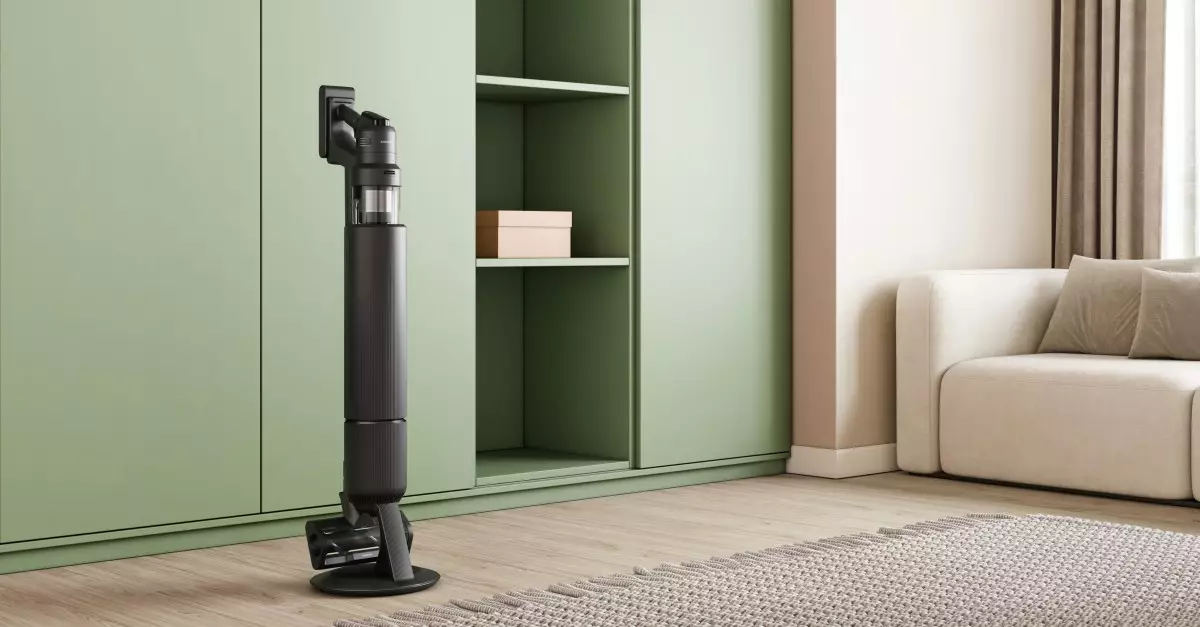As the realm of home technology continues to evolve at a dizzying pace, Samsung has stepped into the limelight with its innovative Bespoke AI range of appliances. The latest models, including the Bespoke Jet AI vacuum, bring an unprecedented level of connectivity and smart functionality to everyday chores. With the advent of an LCD display on the vacuum, integrating smartphone notifications into cleaning routines, Samsung is asserting that cleaning does not have to be a disconnected experience. However, while these advancements herald impressive technological strides, they also invite a critical examination of usefulness and practicality in everyday life.
A Multifunctional Approach: More Than Just Vacuums
The Bespoke Jet AI vacuum boasts features that may shift the way we conceptualize typical household chores. With existing capabilities like 400AW of suction power and an impressive 100 minutes of battery life, it is already positioned as a high-performing device. But the integration of a control panel displaying messages from your phone pushes the boundaries of what we expect from a vacuum cleaner. Imagine being immersed in the hum of your vacuum, only to have it notify you of an incoming call or a text from a friend. This could arguably enhance productivity, keeping you connected to the outside world even during mundane tasks.
Moreover, Samsung extends this technological integration to its Bespoke AI Laundry Vented Combo washer and dryer, which features a 7-inch LCD screen for taking calls while laundering. This connectivity speaks to a larger trend—merging daily functionality with multi-tasking technology—is fascinating. However, as these products become smarter, the question arises: Are we risking an overreliance on technology for foundational tasks that traditionally required minimal intervention?
The Smart Home Ecosystem: A Double-Edged Sword
Samsung’s move to integrate touchscreens into multiple appliances is indicative of the growing trend toward an interconnected smart home environment. These appliances utilize the SmartThings platform, allowing users to manage their home environment through unified controls. The potential stands to create a familiarly digital atmosphere, enabling seamless communication between devices. Imagine looking up recipes on your smart refrigerator that integrates AI cameras to identify available ingredients, then relaying cooking instructions directly to your oven. In theory, this provides an appealing scenario for tech-savvy households craving efficiency.
Nevertheless, the heavy reliance on screens could not only complicate simple tasks but also shift our dependency on the technology itself, leading to a risk of occasional over-complication. The perception of technology as a facilitator can quickly become a burden when a minor malfunction leads to cumbersome operational hiccups. The concern rises further when considering these touchscreens, which could become outdated quicker than their counterpart appliances, possibly rendering costly devices obsolete sooner than expected.
Potential Drawbacks: Are Screens Really Necessary?
While the convenience of an integrated digital experience is tempting, the universal applicability of these large screens may not resonate with every user. For many, the presence of a screen on a washing machine or vacuum may seem excessive rather than beneficial. With traditional knobs and settings still serving their purpose effectively, these added features create an awkward convergence of functionality and distraction. Most people are already inundated with notifications in various aspects of daily life; do we genuinely need another source of distracting alerts in the form of our appliances?
Additionally, there’s the nagging concern that these devices may succumb to a personality problem instead of simply serving their functional roles. Samsung has yet to introduce targeted ads into its appliances, as has been seen with competitors like the Echo Show. But considering the commercial landscape, one cannot help but wonder if smart appliances could be used to foster a new revenue stream, leading users to question their authenticity as true helpers—or if they merely become an additional avenue for advertisement.
As Samsung forges ahead with the Bespoke AI line, it is clear that the integration of technology into the very fabric of household chores reflects an ambition to transform our living spaces radically. The potential for increased efficiency and hands-free multi-tasking is undeniable; however, the implications of overconnectivity and reliance on screens raise pertinent questions around the essence of domesticity. Will these state-of-the-art gadgets simplify our lives, or will their complexities ultimately hinder our simplicity with domestic tasks? The journey toward a fully intelligent home is just beginning, and navigating its twists will be crucial in determining whether we embrace this future enthusiastically or approach it with cautious skepticism.

